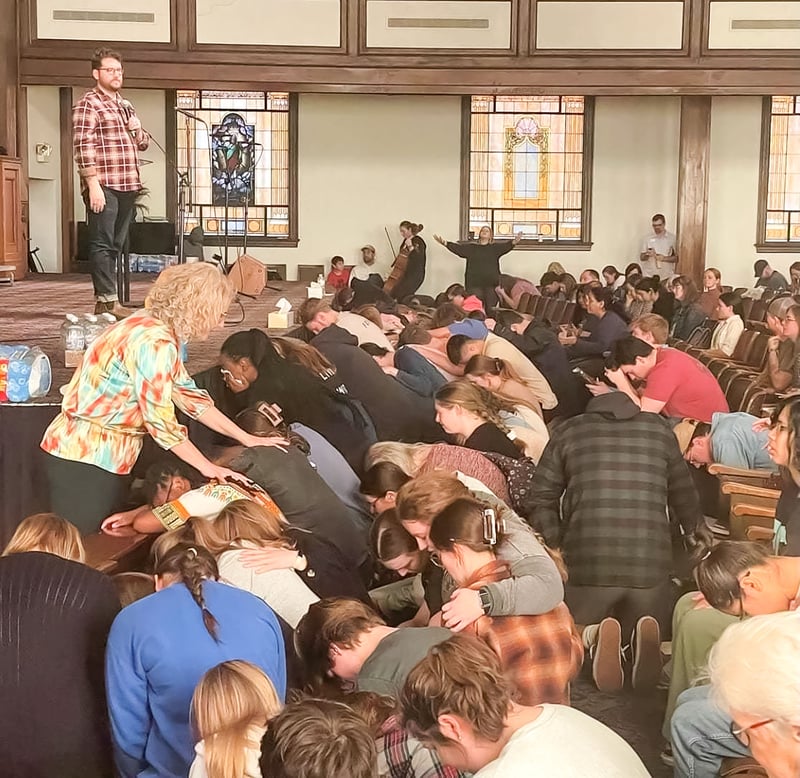Is America Experiencing a Genuine Christian Revival?
A revival at Asbury University has gained national attention through social media and news outlets. But is it a revival of genuine biblical Christianity?

The emotionally driven approach found throughout evangelicalism is not leading people to God, the Bible or genuine conversion. (Photo credit: iStock.com/NoonVirachada.)
In recent days, events at Asbury University, a small religious college in Kentucky, have made national news. Labeled as a revival, videos from the ongoing worship services at Asbury have been showing up on social media, particularly TikTok.
These ads were designed to make Jesus relatable and to frame Him in the context of modern issues—portraying Him as a poor, antiestablishment radical and an influencer who was “canceled.”
But do these things actually represent a true revival—as the Bible would define it?
What is happening at Asbury University?
The revival at Asbury University reportedly began on Wednesday, Feb. 8, when a group of around 100 people attended a chapel service. Instead of ending at its normal time, people didn’t leave. It has now morphed into what NBC News described as “a nonstop prayer and worship session.” The service has continued now for over seven days, 24 hours a day.
On Tuesday, Feb. 14, there were reportedly 3,000 worshippers in the college’s chapel and other overflow facilities.
The service has drawn hundreds of visitors from surrounding areas and spawned similar gatherings at other colleges.
An altar call at the ongoing services at the Asbury University chapel (photo credit: Asbury Revival Facebook Page).
A student writing for the college’s newspaper, The Asbury Collegian, described the scene this way:
“Peers, professors, local church leaders and seminary students surround me—all of them praying, worshiping, and praising God together. Voices are ringing out. People are bowing at the altar, arms stretched wide. A pair of friends cling to each other in a hug, one with tears in her eyes. A diverse group of individuals crowd the piano and flawlessly switch from song to song. Some even sit like me, with laptops open. No one wants to leave.”
Several participants have described the nonstop service as being directly led by the Holy Spirit. When one student was asked why she believes the Holy Spirit is involved in these services, she cited the participants’ physical posture in services as being different than normal and the fact that people who are drawn to the chapel aren’t leaving.
The reporter for the Christian Broadcasting Network (CBN) has openly declared that “the manifest presence of God” is involved in what is happening at Asbury. Students and other evangelicals are expressing their hope and belief that this revival will spread throughout the country, particularly among Generations Y and Z.
What is a revival?
The word being used to describe this ongoing event is revival. It traditionally describes a reawakening of interest in some form of Christian religion and a renewed zeal toward praise and worship.
Throughout American history, there have been various periods of renewed interest in various forms of Christianity. Examples include the Great Awakening in the mid-1700s, the Second Great Awakening of the 1800s, the Pentecostal Azusa Street Revival in 1906, and the evangelical “Jesus movement” of the late 1960s and early 1970s.
So, the trend of a renewed spark of interest in Christian worship is nothing new in American history. Nearly all revivals have been temporary and eventually lose steam, though the form of worship they spawn may continue on. For instance, the modern Pentecostal and evangelical movements largely owe their approach to revivals of the past.
Are there revivals in the Bible?
First, it’s important to note that the word revival is not used this way in the Bible, though there are periods in biblical history that are sometimes labeled as revivals. Typically, they were periods when disobedience, ignorance and neglect of God and His words were addressed and corrected by a strong spiritual leader.
Some examples of biblical leaders who led periods of revival are:
Moses. During the Israelites’ years of captivity in Egypt, they had largely abandoned worship of the true God and lost knowledge of His ways. Even after Moses led them out of Egypt, they soon went back to the Egyptian form of worshipping statues of animals (Exodus 32).
Biblical revivals were characterized by renewed and deepened understanding. They weren’t based simply on emotion.
God used Moses as the intercessor to bring Israel back into a relationship with Him through the Old Covenant. This was all based on Israel’s agreeing to obey God’s laws and worship no other gods except the God of Israel (Exodus 24:7).
Joshua. Moses’ successor then led a renewal of this covenant when he took over leadership of Israel (Joshua 8:34-35).
The Judges. Throughout the book of Judges, we read of a continual cycle: Israel practicing false worship, being punished through captivity, and then being led back to God (albeit temporarily) by a strong leader. (To learn more, read our article on the “Book of Judges.”)
Kings Hezekiah and Josiah. Both of these kings took the throne during periods when Judah had descended deep into pagan idolatry and ignorance of God’s law. Hezekiah led a brief period of renewal when he restored proper temple worship, destroyed pagan idols and restored observance of the Passover (2 Chronicles 29-31).
Years later, King Josiah took the throne after another period of spiritual disintegration and led a similar revival. He destroyed the pagan images and shrines that had been built throughout Judah, restored knowledge of God’s law (2 Kings 22-23) and proper Passover observance (2 Chronicles 35).
Similar periods of revival took place after Judah’s exile and return to Jerusalem under leaders such as Zerubbabel, Ezra and Nehemiah.
Of course, the greatest and ultimate event that could be considered a revival was Jesus Christ’s ministry. He commanded people to repent, taught the proper understanding of God’s law and ushered in the New Covenant era, making it possible for the Holy Spirit to write God’s laws on the hearts and minds of human beings (Jeremiah 31:31-33).
All of these revivals were characterized by renewed and deepened understanding. They weren’t based simply on emotion.
Is the Asbury revival a genuine revival of true Christianity?
The biblical revivals described in the previous section all included some striking similarities to one another—the removal of pagan worship, the restoration of knowledge and practice of God’s law, and repentance.
When we look at what is happening at Asbury University, and other places, we see none of those characteristics. None of what is being described in articles or seen in videos from Asbury includes utter rejection of pagan and false ideas, renewed focus and dedication to obeying God’s law or true biblical repentance.
The current emotionally driven religious approach found throughout evangelicalism is not leading people to God, the Bible or genuine conversion. It’s just one of many false forms of religious expression found in our world that have their roots in human ideas and are driven by feelings, not truth.
Emotional experiences alone do not equate to genuine biblical repentance and conversion. A genuine revival, be it among a group or in someone’s personal life, will be marked by confession of sins, genuine heartfelt repentance toward God, seeking baptism and committing one’s life to obedience to God’s law.
Like the revivals led by Hezekiah and Josiah, a biblical revival would also include a restoration of God’s holy times—the weekly Sabbath and seven annual festivals of God.
To learn more about genuine repentance and conversion, read “How to Repent” and “What Is Conversion?”
Two serious warnings about modern religious messaging
Despite what many religious people think, we are not seeing a popular revival of true Christianity today. Neither the Asbury revival nor the “He Gets Us” marketing campaign is leading people to the true God. They represent human religious ideas and emotional experiences wrapped in a veneer of biblical language. They don’t emphasize genuine repentance or proclaim the message Jesus taught, the gospel of the Kingdom of God (Mark 1:14).
The Bible warns that not everything wrapped in biblical language is, in fact, biblical truth. Two biblical warnings should be considered.
1. “But why do you call Me ‘Lord, Lord,’ and not do the things which I say?” (Luke 6:46).
Jesus’ warning is that people can talk a lot about “Jesus”—often appropriating His name to sell their religious message. But do they actually teach the things He taught? Do they obey His commands? Do they submit their lives fully to Him?
If they don’t, they are just spreading a form of vain, or useless, worship (Mark 7:7).
2. “For if he who comes preaches another Jesus whom we have not preached, or if you receive a different spirit which you have not received, or a different gospel which you have not accepted—you may well put up with it!” (2 Corinthians 11:4).
Paul’s warning builds on Jesus’ warning by pointing out that it’s possible to preach a different Jesus—a Jesus who teaches a different message and who appears very different from the genuine Jesus of the Bible.
The Jesus being proclaimed at Asbury and in the “He Gets Us” ads is an example of a “different Jesus.”
The only way to discover the true Jesus Christ and the message He taught is to go to the Bible.
You can have a genuine revival
The entire concept of revival needs to be properly understood according to the Bible. The Bible does use the word revive to describe real repentance and a restored focus on God and His ways (Psalms 80:18; 85:6; 119:37, 154; Isaiah 57:15).
Biblically speaking, you can be genuinely revived by turning to God’s Word as your source of truth, believing the gospel message of the Kingdom of God, repenting and obeying His Word on a daily basis.
Genuine biblical conversion isn’t based on an emotional religious experience in a chapel; it is a change in how you think, what you believe and how you live your life on a daily basis.
That’s the kind of revival you need. That’s the kind of revival our nation and world needs.
The good news is that this world will experience a true revival, actually a restoration (Acts 3:21), after Jesus Christ returns to earth and sets up His Kingdom.
To learn more about this coming restoration, read about “The Prophesied Restoration of All Things.”
Date Posted: February 17, 2023



